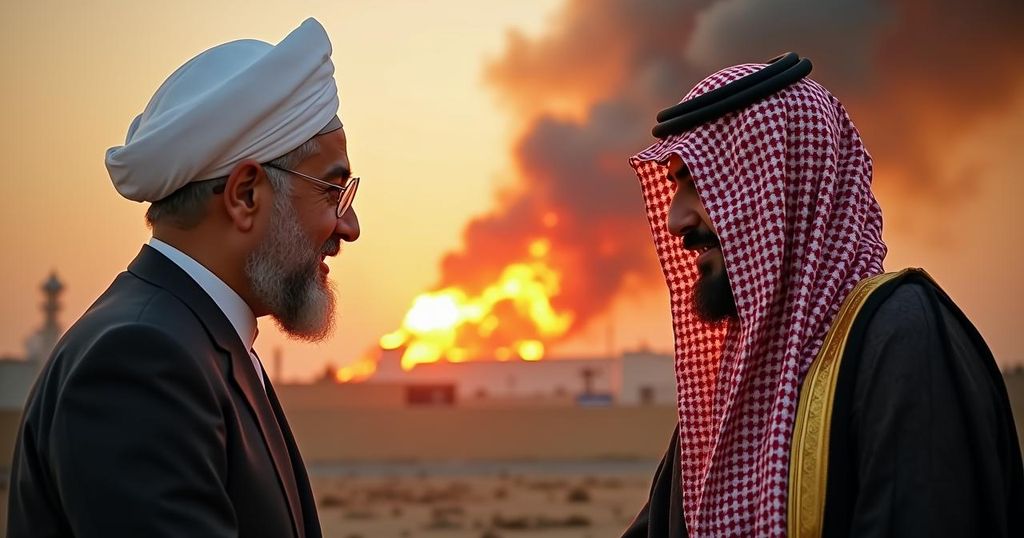Iran Threatens Saudi Arabia Amid Rising Tensions Over Israeli Airstrikes

Iran has threatened military retaliation against Saudi Arabia in response to its support of Israeli airstrikes on Iranian targets. This warning, conveyed by Iranian Foreign Affairs Minister Abbas Araghchi during a trip to Riyadh, jeopardizes the recent truce established between the two nations. With rising tensions following military engagements involving Israel, experts express concern over the truce’s sustainability, emphasizing the necessity for ongoing diplomatic dialogue to manage the escalating situation.
Iran has issued a serious warning to Saudi Arabia regarding potential military action focused on Saudi oil installations. This threat emerges in response to Saudi Arabia allegedly allowing Israeli airstrikes against Iran from its airspace. During a recent diplomatic visit to Riyadh, Iranian Foreign Affairs Minister Abbas Araghchi conveyed this message, asserting that should Saudi Arabia open its airspace to Israeli operations targeting Iran, the nation would retaliate, potentially through Iranian-supported militias positioned in Iraq and the Houthi forces in Yemen. This tension heightens concerns about the fragility of the ongoing truce established between Iran and Saudi Arabia following their rapprochement, brokered with the assistance of China in 2023. The backdrop to these developments includes escalating military actions between Israel and Iranian forces, particularly following Israel’s intensified strikes against the Hezbollah militia in Lebanon and Iran’s missile attack on Israel on October 1, 2023. Israeli officials have vowed retaliation, raising speculation over strikes on Iranian oil facilities and provoking fears of Iranian retaliation directed toward Gulf states perceived to facilitate such actions. Iranian sources have indicated that potential targets for reprisals include Gulf countries that host U.S. military bases, explicitly naming Jordan, the United Arab Emirates, Saudi Arabia, and Qatar. Experts suggest that the ongoing violence and hostilities are a major threat to the delicate balance crafted by the recent Iran-Saudi diplomatic engagement. This truce has alleviated decades of proxy warfare, particularly in Yemen, where Iran has supported Houthi insurgents against Saudi-backed governmental forces. Moreover, the potential for an attack on Saudi oil infrastructure poses risks not only to regional stability but also to global oil markets, which remain sensitive to disruptions in supply. Despite recent tumult, analysts suggest that diplomatic dialogue remains critical in managing regional tensions, warning that any new acts of aggression could disrupt this fragile peace.
The ongoing tensions between Iran and Saudi Arabia represent a complex interplay of regional power dynamics, influenced significantly by their respective support for opposing factions in various conflicts across the Middle East. Historically, these nations have found themselves in a prolonged cold war characterized by proxy battles, notably in places such as Yemen. The recent diplomatic thaw, which ultimately led to the establishment of a truce in 2023, indicated a mutual interest in stabilizing the region to facilitate broader economic and political objectives. This diplomacy is particularly pertinent against the backdrop of rising tensions involving Israel and other neighboring states, thereby complicating the security landscape in the Gulf region. The intricate network of alliances and hostilities among Iran, Saudi Arabia, Israel, and U.S. allies underlines the precariousness of peace efforts and the potential for rapidly escalating conflict.
In conclusion, the warning issued by Iran signifies a critical juncture in the fraught relations between Iran and Saudi Arabia. As military tensions mount, particularly arising from potential Israeli operations supported by Gulf states, the risk of renewed hostilities threatens not only the established truce but also regional stability and global oil markets. The necessity for continued diplomatic engagement remains paramount, as it provides a framework for mitigating potential conflicts that could exacerbate the prevailing instability. The international community, particularly nations with vested interests in the region, should thus encourage dialogue to preserve the fragile peace established in recent years.
Original Source: www.businessinsider.com








